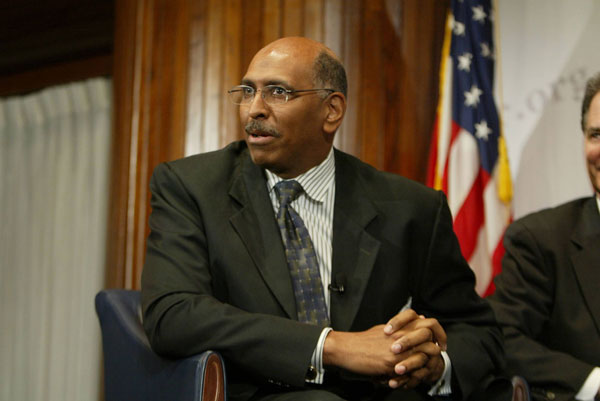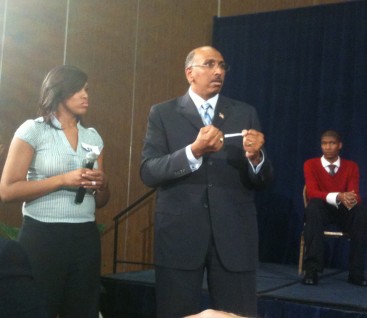Steele’s ‘Freedom Tour’ Stops at Howard
An uneasy mix of town hall meeting and self empowerment lecture, Michael Steele puzzled some members of the crowd at Howard University.
Jul 31, 202096.8K Shares1.3M Views
Michael Steele might have lost them when he talked about hip-hop. Early into his Sept. 1 event at Howard University, a well-promoted affair that filled a small ballroom, the first black chairman of the Republican National Committee went on a tangent about his seven-month-old musingson how the GOP could appeal to voters in “urban/suburban hip-hop settings.” The audience, mostly students of the historically black college, listened raptly.
“A lot of folks,” said Steele, “have given me a hard time when I talk about hip-hop Republicans.” That got some laughs, and Steele smiled. “Yeah,” he said.
Image by: Matt Mahurin
“I’ll tell you what was interesting about the response I got from the media,” Steele said. “I think a lot of people, they went to a stereotype. Black and white. And it’s interesting, the responses, because what I was saying–I wasn’t talking about Republicans all of a sudden walking around with, you know, all the bling-bling.” Steele pantomimed an imaginary chain on his neck, and danced a small step.
Steele’s event, an uneasy mix of town hall meeting and self-empowerment seminar, had a small media presence and a turnout of around 200 students. The first event like this, a late June town hall in Detroit, was a small success. This leg of Steele’s “Freedom Tour,” an occasional speech series first announcedat the NAACP’s 100th anniversary celebration, came after a month of boisterous protests that, Republicans believe, have bolstered them in the health care debate. It came after a week of Steele campaigning for a “seniors’ bill of rights” on health care. This night, though, he wanted to talk about hip-hop.
“It wasn’t glorifying, you know, the violence, and the language, and all of the other aspects of some of this music,” Steele said. “It was about the ability to create wealth. It was about the ability to create legacy wealth. You have amongst you right now a generation of African-American entrepreneurs who are creating incredible wealth, and they’re investing it, some of it, in the community. They’re controlling that wealth. How are they doing it? Well, instead of the publisher or the record company owning the rights to their music, they own the record company.”
Not for the the last time, a few members of the crowd furrowed their brows, looking confused.
Image has not been found. URL: /wp-content/uploads/2009/09/IMG_0190.JPGMichael Steele speaks at Howard University on Sept. 1, 2009. (David Weigel)
Not only had Steele not previously said this, it didn’t make a lot of sense. It was a strange segue from another, stronger point — that Republicans like Steele wanted black Americans to prosper and start their own businesses. “Our country can afford more than one Oprah Winfrey,” said Steele. But the hip-hop kept coming back in. Steele had talked about uplift with young men, alongside “friend Russell Simmons,” the CEO of Def Jam records. “Rev. Run was there.”
There were some hiccups in the staging. The first two rows of chairs in a room that filled up quickly were reserved for VIPs and for local young Republican activists. The chairs sat empty past the 6:30 p.m. start time. Then, all at once, a large group of young, white Republicans walked in. The complexion of the room changed immediately as some of the students who’d been waiting sighed and whispered to one another.
Three students, from Howard, George Washington and American Universities, sat onstage waiting for Steele. When he arrived, after a glowing introduction by the RNC’s Angela Sailor (“shoes are not easy to walk in if you intend to be a trailblazer”), he conducted short interviews with them.
“I hope to go to law school and study business law,” said the George Washington student.
“Mo’ money!” said Steele.
“Yes, sir!” she said. The laughter didn’t go much further.
After that, the special guests sat on the stage as Steele waded into the audience. “I’ve got my own microphone,” he said, brushing aside a stage microphone that had been emitting ugly waves of feedback. He went off into examples, like the hip-hop example, and asked the students to look at his life for some kind of guidance. “I grew up two miles up the road, on Georgia Avenue, in Petworth,” said Steele. “How did I get to be here?”
Michael Steele speaks at Howard University on Sept. 1, 2009. (David Weigel)
As the evening stayed close to the script, Steele was game and self-deprecating. One student proclaimed her desire to become a United States senator from Maryland. “So you’d be a Democratic senator,” said Steele, mock-ruefully, making light of his failed 2006 bid for that office. But not much was happening with the questions audience members had written on scraps of paper. A graduate student named Silvan Champagne sat patiently with a question about for-profit health care, perking up when Steele took a similar question about a Medicare-style “public option.”
It was then that the event went off script. Steele led into his answer with a rudimentary explanation of the issues. Amanda Duzak, a Towson University graduate who’d moved to Washington recently and come to this town hall with the possibility of protest in mind (she’d brought a sign that was taken at the door), stood up and interrupted him.
“My mother died of cancer six months ago because she could only afford three of her six prescription chemotherapy medications,” said Duzak. “Everyone in this room and everyone in this country should have access to good health care.”
The audience crackled back to life, applauding Duzak (who was white), as Steele laughed and looked for his footing. He found it by taking the stance he’d accused Democrats of taking: knocking Duzak for bringing her dissent into a public meeting.
“You can shout, and I can ignore you,” said Steele. “Or you can engage and pay attention and learn from it. Because you present something they may not know, they may not appreciate, they may not have ever heard it before. So when people go out to town halls, they go out to the community, and they’re like this?” Steele raised his fists, imitating the angry Duzak. “It makes for great TV. You’ll probably make it tonight. Enjoy it.”
The crowd swooned, applauding Steele, who went back after Duzak: “You have not furthered the debate.” She marched out toward the main entrance, but was stopped by a police officer and ushered back, down a stairwell. Steele took one more question and left abruptly, off to an interview with the student press. Ashley Reese, a sophomore journalism major at Howard, came over the row Duzak had been sitting in to talk to one of the activists who’d come with her.
“I just wanted to say … I don’t like the shouting and all of that,” said Reese. “But I agree with what you said. He should have taken more questions.”
–

Rhyley Carney
Reviewer
Latest Articles
Popular Articles


